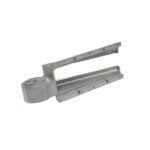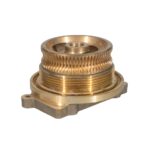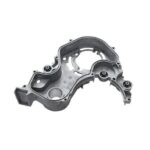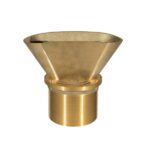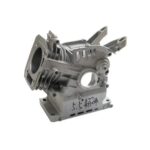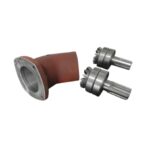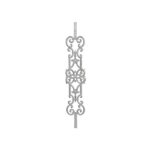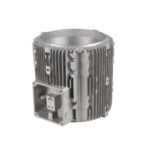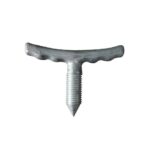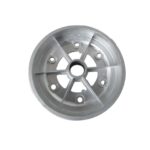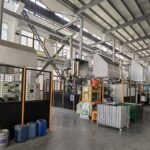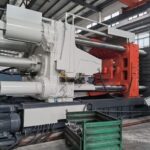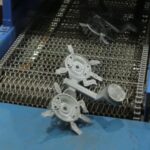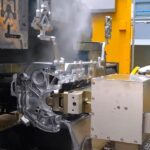Aluminum casting involves creating custom cast parts and products by pouring hot molten aluminum into mold cavities, which then cools and solidifies into the desired shapes. Aluminum is one of the most commonly used metals for casting processes.
Aluminum casting provides several key benefits compared to other casting methods, such as being relatively cost-effective and producing parts with high precision, excellent surface finish, and mechanical properties that are suitable for various applications.
Yongzhu Metal is a leading aluminum casting company in China. We manufacture high-quality aluminum castings to serve a variety of industries, including automotive, Energy, Lighting, Medical, Home Furnishings, and Machinery and Equipment.
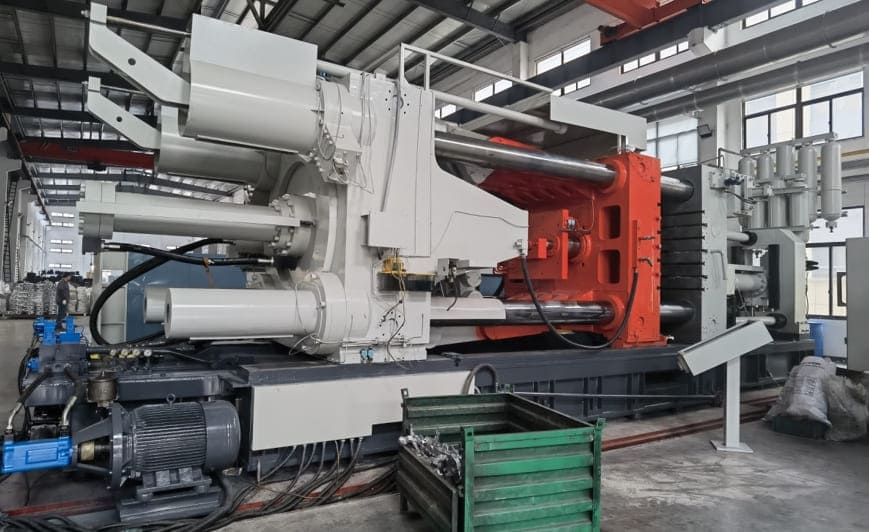
Aluminum Casting Process
First, the design of the mold is critical because it determines the final form of the casting. Typically, the molds are composed of two-part patterns made of wood or metal materials to achieve this purpose.
Following this, the mold needs to be treated with a release agent to prevent the aluminum from adhering to it during the casting process. Once the mold is closed and molten aluminum is poured into the cavity, the casting process can proceed.
As the aluminum cools and hardens in the mold, it adopts the intended form and shape. After the casting has solidified, the mold can be opened to remove the finished product.
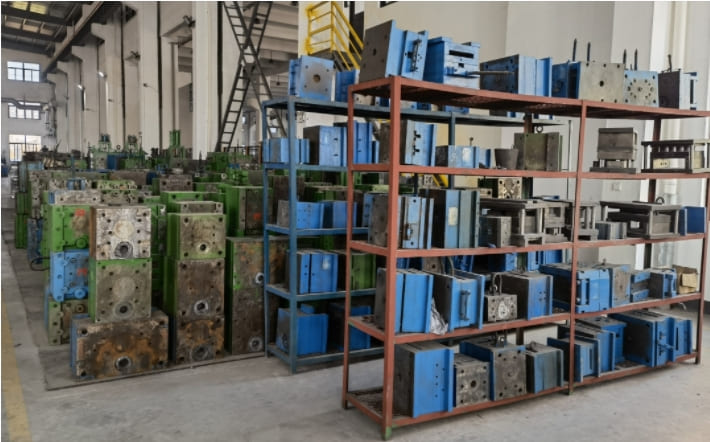
Aluminum Casting Types
To cater to the various needs of cast aluminum components, Yongzhu Metal provides an array of aluminum casting types as described below:
High Pressure Aluminum Die Casting
In high pressure aluminum die casting, molten aluminum is injected into a steel mold using a die casting machine under significant force and high pressure.
This method allows for the production of precisely shaped aluminum parts with minimal machining and finishing required. It is mainly suitable for the mass production of thin-walled aluminum products.
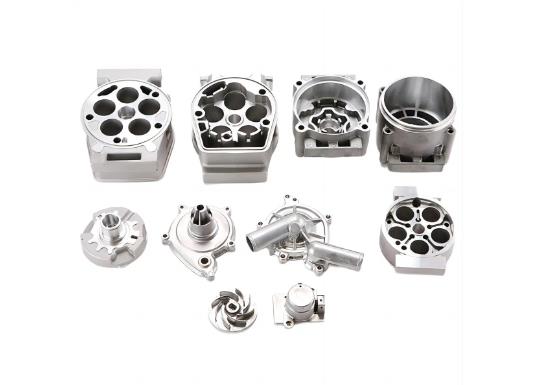
Low Pressure Aluminum Die Casting
In the low pressure die casting process, the metal is moved from an airtight furnace through a rising tube into a metal tool. The casting temperature reaches around 750°C.
This method is a competitive choice when production volumes are moderate or when heat treatment is necessary to enhance the mechanical properties of the casting.
The tolerances and surface finish achieved are similar to those from gravity die casting. Although tooling costs are higher than those of sand casting, low pressure die casting is ideal for producing thicker aluminum parts, even in small quantities.
Aluminum Gravity Die Casting
Aluminum gravity die casting uses molds and cores made of steel or other metals. The molten aluminum is typically poured into the mold, and occasionally, a vacuum may be applied.
Castings made with this method tend to be stronger than those from other methods such as die or sand casting.
Also known as aluminum gravity casting in China, this process uses semi-permanent mold casting techniques when removing permanent cores from the finished part would be challenging.
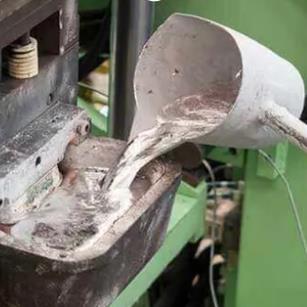
Aluminum Sand Casting
Sand casting is the most adaptable method for creating aluminum products. The process starts with a pattern that mirrors the final casting.
Almost any pattern can be pressed into a fine sand mixture to create the mold into which the aluminum is poured. The pattern is slightly larger than the desired part to account for aluminum shrinkage during solidification and cooling.
Though slower than die and permanent mold casting, sand casting is often more cost-effective for producing small quantities, intricate designs, or very large castings.

Contrast of Aluminum Casting Techniques
Here’s an optimized version of the provided table:
| Casting Method | Sand Casting | Gravity Die Casting | Low Pressure Die Casting | High Pressure Die Casting |
|---|---|---|---|---|
| Weight of Casting (kg) | 0.1-500 | 0.01 – 50 | 1 – 70 | 0.01 – 30 |
| Annual Production Volume | 1 – 5,000 | 100 – 50,000 | 100 – 10,000 | 5,000 – 1,000,000 |
| Tooling Cost | Low | Moderate | Moderate | High |
| Change Cost | Low | Moderate | Moderate | High |
| Design Flexibility | High | High | Relatively High | Relatively High |
| Min. Wall Thickness (mm) | 4 – 6 | 3 – 4 | 3 – 4 | 0.8 – 1.5 |
| Dimensional Accuracy | Fairly Good | Good | Good | Very Good |
| Surface Roughness (Ra) | >6.3 – 12.3 | ≥3.2 (2.5) | ≥3.2 | ≥1.6 (0.8) |
| Sample Delivery (weeks) | 3 – 5 | 4 – 5 | 5 – 6 | 4 – 5 |
| Special Features | Sand cores and heat-treated | Sand cores and heat-treated | Sand cores and heat-treated | Heat treated under special conditions |
Benefits of Aluminum Casting
Here is a table summarizing the key benefits and limitations of aluminum casting:
| Aspect | Details |
|---|---|
| Benefits | Allows creation of intricate designs and shapes in die-cast parts, enabling customized castings for specific production needs |
| Enables high production rates and faster manufacturing compared to other alloy materials | |
| Achieves near net shape, potentially eliminating the need for additional machining to create finished parts | |
| Possesses strength of steel while being lightweight, offering superior aesthetic appeal and appearance | |
| Cost-effective, making high-quality metal products more accessible to consumers | |
| Versatile and corrosion-resistant, suitable for various applications, with longer lifespans providing more value to consumers | |
| Low melting point, making casting easier and more affordable compared to metals like steel | |
| Readily available, easing sourcing for manufacturers | |
| Limitations | Equipment for casting process can be costly, especially for smaller manufacturers |
| Complex process requiring specialized knowledge and expertise | |
| Outsourcing to specialized casting companies like Yongzhu Metal can help overcome limitations |
Surface Treatment Choices for Aluminum Castings
Aluminum castings offer various surface treatment options to enhance their appearance and properties. Here are some common methods:
- Anodizing: Anodizing is an electrochemical process that forms a protective oxide layer on aluminum castings. This layer can be tinted to achieve various colors, providing both durability and corrosion resistance.
- Powder Coating: Powder coating entails applying a dry powder to aluminum castings and then curing it with heat. The result is a long-lasting and visually appealing finish.
- Polishing: Polishing creates a high-gloss finish on aluminum castings through mechanical grinding and buffing. This process enhances the surface’s shine and smoothness.
- Painting: Painting is a widely used finish option to achieve different colors and finishes. Aluminum castings are typically primed before being painted with a topcoat for the desired look.
- Sandblasting: Sandblasting uses a high-pressure stream of abrasive materials, such as sand, to clean and texture the surface of aluminum castings. This technique can produce a matte finish or prepare the surface for other finishing treatments.
- Shot Blasting: Similar to sandblasting, shot blasting utilizes small metal pellets instead of sand to create a textured surface. This process can produce a matte or slightly rough finish on aluminum castings.
These are just a few examples of the many surface finish options available for aluminum casting. The ideal choice depends on the specific application and desired aesthetic of the final product.
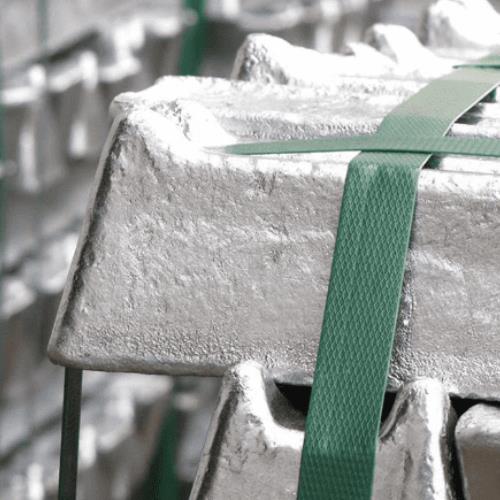
Applications of Aluminum Casting
Here’s the table summarizing the content provided:
| Industry | Application | Advantages | Details |
|---|---|---|---|
| Aerospace | Aircraft Components | Lightweight and corrosion resistance | Aluminum components comprise approximately 80% of an aircraft’s structure. |
| Automotive | Vehicle Parts | High strength and cost-effective | Transitioning from steel to aluminum for reduced vehicle weight and improved fuel efficiency. |
| Marine | Marine Hardware | Corrosion resistance and durability | Used for cleats, handles, brackets, and covers. |
| Agriculture | Machinery Parts | Important for key components | Aluminum casting produces crankcase housings, gearbox housings, and motor housings. |
| Lighting | Lighting Fixtures | Durability and efficiency | Offers non-toxic, lightweight, and corrosion-resistant lighting products. |
| Heatsinks | Electronic Devices | Thin, complex structures | Heatsinks are made using aluminum die casting. |
| Brackets | Industrial and Residential | Strength and durability | Aluminum casting enables near-net-shape brackets with holes cast directly during production. |
Contact Yongzhu Metal for Your Aluminum Casting Project
If you are in search of a trustworthy partner for your aluminum casting project, Yongzhu Metal is an excellent option to consider.
With years of experience in the field, Yongzhu Metal has built a reputation as a leader in aluminum casting and is trusted by businesses across different industries.
Here are some reasons to choose Yongzhu Metal for your next aluminum casting project:
Expertise and Experience
Yongzhu Metal has been offering top-notch aluminum casting services for over a decade. We have collaborated with clients in various industries, such as aerospace, automotive, construction, and more.
Our team of specialists is skilled in the latest casting methods and technologies, providing accurate and consistent results every time.
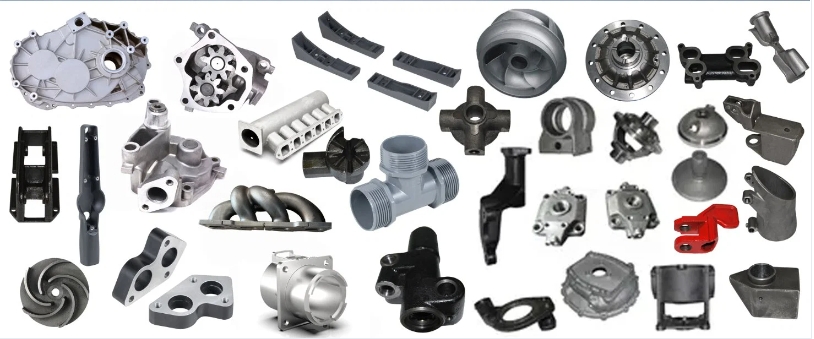
State-of-the-Art Facilities
Yongzhu Metal has made significant investments in cutting-edge facilities to ensure the best possible service for our clients.
We have a range of advanced equipment, such as induction furnaces, gravity casting and die casting machines, and CNC machines, allowing us to produce high-quality aluminum castings efficiently.
Strict Quality Control
At Yongzhu Metal, quality is our top priority. We have stringent quality control processes in place to guarantee that every casting we produce meets the highest standards of quality and precision.
Advanced testing equipment, such as spectrometers, X-ray machines and CMM, help us ensure the castings meet required specifications.
Customization Options
Yongzhu Metal recognizes that every project is distinct and offers a variety of customization options to suit clients’ specific needs.
We can produce aluminum castings in a variety of sizes and shapes and offer different surface finishes and coatings as required.
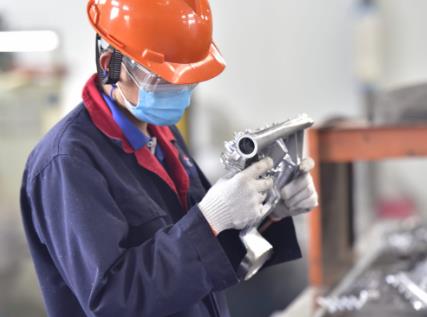
Competitive Pricing
Yongzhu Metal offers cost-effective pricing for our aluminum casting services.
We understand the importance of managing costs and work closely with our clients to provide high-quality castings at an affordable rate.
Contact us today to discuss your project needs and receive a quote, you can trust us to deliver exceptional castings that meet your requirements.


